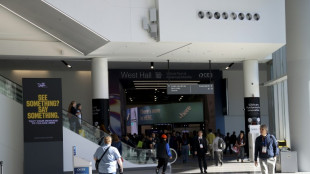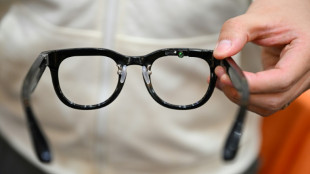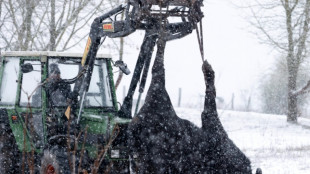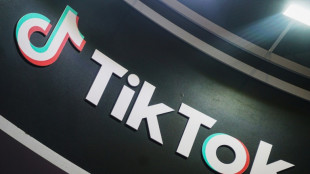
-
 Toll from French tram crash rises to 68 injured
Toll from French tram crash rises to 68 injured
-
Apple wants to keep diversity programs disavowed by other US firms

-
 Cyclone-ravaged Mayotte on high alert as new storm approaches
Cyclone-ravaged Mayotte on high alert as new storm approaches
-
Cyclone-ravaged Mayotte on red alert for new storm

-
 Scramble to shelter animals from Los Angeles wildfires
Scramble to shelter animals from Los Angeles wildfires
-
China's women e-sports players defy sexism for love of the game

-
 Tech sector's energy transition draws attention at Vegas show
Tech sector's energy transition draws attention at Vegas show
-
Five things to know about New Glenn, Blue Origin's new rocket

-
 Blue Origin set for first launch of giant New Glenn rocket
Blue Origin set for first launch of giant New Glenn rocket
-
Dutch police detain hundreds at climate protest

-
 Germany battles to secure stricken 'Russian shadow fleet' oil tanker
Germany battles to secure stricken 'Russian shadow fleet' oil tanker
-
Malala Yousafzai 'overwhelmed and happy' to be back in Pakistan

-
 'Education apartheid': schooling in crisis in Pakistan
'Education apartheid': schooling in crisis in Pakistan
-
Smart glasses enter new era with sleeker designs, lower prices

-
 Supreme Court looks poised to uphold TikTok ban
Supreme Court looks poised to uphold TikTok ban
-
2024 hottest recorded year, crossed global warming limit

-
 Germany reports foot-and-mouth disease in water buffalo
Germany reports foot-and-mouth disease in water buffalo
-
US hikes reward for Maduro arrest after 'illegitimate' swearing-in

-
 Robots set to move beyond factory as AI advances
Robots set to move beyond factory as AI advances
-
Pro-Russian disinformation makes its Bluesky debut

-
 UK gas reserves 'concerningly low', warns biggest supplier
UK gas reserves 'concerningly low', warns biggest supplier
-
2024 warmest year on record for mainland US: agency

-
 Meta policy reversal puts question mark on future of fact-checking
Meta policy reversal puts question mark on future of fact-checking
-
Meta policy reversal puts question mark on furure of fact-checking

-
 Strong US jobs report sends stocks sliding, dollar rising
Strong US jobs report sends stocks sliding, dollar rising
-
US hiring beats expectations in December to cap solid year

-
 UK gas reserves 'concerningly low': Biggest supplier
UK gas reserves 'concerningly low': Biggest supplier
-
Global stocks mostly fall before US jobs data

-
 Ubisoft: the 'Assassin's Creed' maker targeted by suitors
Ubisoft: the 'Assassin's Creed' maker targeted by suitors
-
Stock markets drift lower as US jobs data looms

-
 Pakistan flight departs for Paris after EU ban lifted
Pakistan flight departs for Paris after EU ban lifted
-
Nobel laureate Malala Yousafzai to visit native Pakistan for girls' summit

-
 AI comes down from the cloud as chips get smarter
AI comes down from the cloud as chips get smarter
-
Tajikistan bets on giant dam to solve electricity crisis

-
 Uruguay bucks 2024 global warming trend
Uruguay bucks 2024 global warming trend
-
Last 2 years crossed 1.5C global warming limit: EU monitor

-
 Japan 'poop master' gives back to nature
Japan 'poop master' gives back to nature
-
US Supreme Court to hear TikTok ban case

-
 US Fed's December rate cut should be its last for now: official
US Fed's December rate cut should be its last for now: official
-
Paris Hilton among celebrities to lose homes in LA fires

-
 Airbus boosts plane deliveries in 2024
Airbus boosts plane deliveries in 2024
-
Ubisoft reviews restructuring options, postpones new Assassin's Creed

-
 Lamborghini sets new sales record amidst hybrid push
Lamborghini sets new sales record amidst hybrid push
-
Lebanon army chief Aoun becomes president after two-year vacancy

-
 US emissions stagnated in 2024, challenging climate goals: study
US emissions stagnated in 2024, challenging climate goals: study
-
Lebanon army chief short of required majority in first round of president vote

-
 Global stock markets mixed tracking US rates outlook
Global stock markets mixed tracking US rates outlook
-
Lebanon meets to finally elect president after two-year vacancy

-
 Celebrities flee Los Angeles fires, lose houses as Hollywood events scrapped
Celebrities flee Los Angeles fires, lose houses as Hollywood events scrapped
-
Japan startup hopeful ahead of second moon launch

| BCC | -1.31% | 115.88 | $ | |
| SCS | -3.01% | 10.97 | $ | |
| RBGPF | 100% | 60.49 | $ | |
| NGG | -3.3% | 56.13 | $ | |
| RELX | -0.86% | 46.37 | $ | |
| RYCEF | -0.42% | 7.07 | $ | |
| GSK | -1.99% | 33.09 | $ | |
| RIO | 0.36% | 58.84 | $ | |
| CMSC | -0.79% | 22.92 | $ | |
| CMSD | -0.65% | 23.25 | $ | |
| BCE | -2.92% | 22.96 | $ | |
| VOD | -1.99% | 8.05 | $ | |
| JRI | -1.16% | 12.08 | $ | |
| AZN | 0.64% | 67.01 | $ | |
| BTI | -2.34% | 35.9 | $ | |
| BP | 0.54% | 31.29 | $ |

Japan's prices are finally rising, but will it last?
From rice balls to nappies, prices are rising in Japan. But unlike inflation seen in many other places, the increases are long-sought but also unlikely to last, analysts say.
Since the 1990s, the country has swung between periods of sluggish inflation and deflation, where prices are falling -- both considered bad for growth.
The central bank has tried an array of policies including pushing interest rates to rock-bottom to encourage spending and reach a two-percent inflation target, seen as key to boosting prosperity in the world's third-largest economy.
It hasn't worked: in 2021, the price of goods, not including volatile fresh food, inched down by an average of 0.2 percent.
But pandemic recovery demand, as well as a surge in oil and other commodities linked to the Ukraine war, may finally be achieving what the Bank of Japan couldn't.
Major Japanese companies have started raising the price of goods in a previously unthinkable, and sometimes controversial, fashion.
The maker of beloved children's corn snack Umaibo was even forced to apologise for the "commotion" caused by rumours ahead of a price rise amounting to two US cents, the first increase since its 1979 debut.
Other hikes have also made headlines in a country where wages and prices have long been stagnant.
The increases have been tough to make, according to Shigeto Nagai of Oxford Economics.
The so-called lost decades that followed Japan's 1980s boom have "cemented a deflationary mindset" among consumers, he told AFP.
"People believe that wages and prices will not grow," and so companies fear losing ground to competitors if they price items higher, he explained.
On a narrow, bustling street in eastern Tokyo, shopkeepers said they felt squeezed by a pandemic downturn and higher costs for essentials such as cooking oil, flour and fuel.
But many prefer to absorb extra costs rather than pass them on.
"We have been in business for over 70 years... we are extremely close to our customers," said Satoshi Okubo, whose family shop sells sweets and chewy udon noodles.
"For now, I am swallowing the increased costs," he told AFP. "We will only decide to increase our prices when it becomes absolutely necessary."
- Shrinkflation -
Some companies have instead opted to reduce the size of products while leaving the price unchanged, a move dubbed "shrinkflation".
But this risks irritating customers like Masayuki Iwasa, 45, who since 2020 has documented shrinking goods and price increases on his website "Neage", which means "price hikes" in Japanese.
"Some companies clearly say what they are doing, and others don't. If they announce what they are doing, I think customers would understand," he told AFP.
Despite the challenges, prices have been climbing in Japan since the autumn, albeit at nowhere near the blistering pace seen in Europe or the United States, where inflation recently hit a 40-year high of 7.9 percent.
Core consumer prices, excluding fresh food, increased by 0.6 percent on-year in February, according to data released Friday, and some economists predict Japan could reach its two-percent inflation target in the coming months.
That level is "not sustainable" though, Nagai said, because it is driven by external factors and intensified by a weaker yen.
One key to achieving longer-lasting price rises is wage increases, which for decades companies have kept low in part to avoid hiking the cost of products for consumers.
Jobs once for life and laden with benefits have been swapped for cheaper part-time roles, often occupied by women, and even those with lifetime jobs have seen paltry pay rises.
Prime Minister Fumio Kishida has made wage increases a central plank of his economic policy, calling for companies to lift salaries by three percent in annual spring wage negotiations.
Recent years have produced only marginal increases as trade unions prioritise job protection, however, and this year's first negotiations have been disappointing for Kishida and the unions.
Nagai also warns that unexpected events such as the wave of the Omicron coronavirus variant could impact efforts to hike inflation.
"We have been hoping for 'revenge consumption' by consumers (after pandemic restrictions), but many households have really experienced a sharp deterioration in real disposable income," he said.
P.Petrenko--CPN
